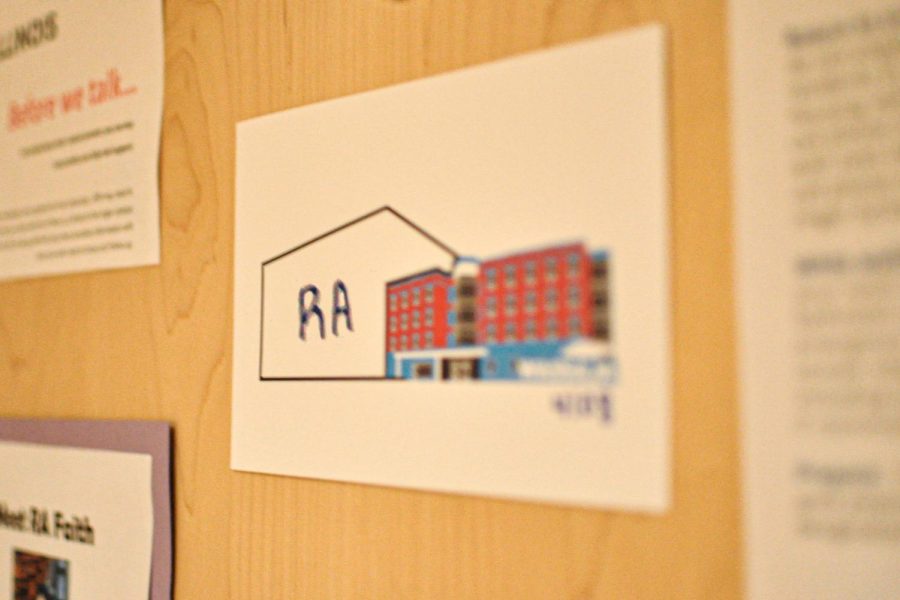Opinion | Dorms aren’t prisons: Stop random patrols
Outside of a RA’s door in Wassaja Hall on Saturday. Columnist Talia Duffy believes patrols from resident advisors makes dorms less of a home and creates a more distant relationship among students.
February 16, 2022
Teenagers have a natural resistance to authority. And for college freshmen, newly freed from their parents, able to make their own choices and given a sprawling campus to explore? The resistance is multiplied a thousandfold.
Hence the demonization of resident advisers — RAs, for short.
The sound of those two simple letters — “RA!” — has become a warning, sending residents of University dorms scrambling to pull out their masks or hide their — ahem — beverages in the suspicious ottoman next to the mini-fridge. For many, the existence of RAs is a nuisance, an unwelcome interruption to a blossoming sense of independence.
As a freshman, I too have fallen victim to this mindset. However, when I pocket my naivete for a moment, I recognize the importance of RAs. They’re just doing their job — a job that’s necessary when hundreds of young people occupy the same building.
The relationship between RAs and their residents is flawed. The solution to this conflict is not to change residents’ attitudes but rather the operations of RAs themselves — namely, random patrols.
Get The Daily Illini in your inbox!
The place where anyone lives should be a source of comfort and safety for them. This is especially true for university students, many of whom are leaving their childhood homes for the first time. But random patrols exude hostility, completely altering the environment of residence halls.
Random patrols are when RAs take spontaneous laps around their floors and search for any sign of wrongdoing. If they find a student, for example, walking in the hallway without a mask or being too loud, they take a picture of the student’s i-Card and report them.
Even more disturbingly, the worst RAs seem almost giddy at the discovery of a broken rule and emanate elementary school tattle-tale energy.
Congratulations, you busted a student who took two steps outside their door to fill up a water bottle without dawning a mask. Does that make you feel good? Does that bring you joy? Does it bring you a sense of justice to knock on that student’s door and say they’re laughing too loud for 11 p.m. on a Thursday?
Those violations, in the grand scheme of things, are completely harmless. Random patrols serve no purpose besides the creation of a hostile living environment. If anything, they make the jobs of RAs more difficult.
This seems counterintuitive, but think about it. If students feel their RAs are out to get them, resistance to their authority will only grow. Residents that have more respect for their RAs are more willing to listen to their suggestions and follow the rules.
In addition, if distrust grows too high, students will feel unable to reach out for help in case of an emergency. This compromises the most important part of an RA’s job: Keeping their residents safe. Down the line, the adversarial resident-RA relationship created by random patrols can’t justify the practice.
Of course, RAs should be there to enforce the rules if things get out of hand or if someone asks for their involvement. But their actions should be responsive, not offensive.
RAs should be sources of support during students’ transition into independence. They should act as their residents’ equals, fostering a community of reciprocated respect. They should be keepers of the peace, not soldiers.
Residence halls are not prisons. For at least nine months out of the year, they are what thousands of students across campus call home. With the elimination of random patrols, it’ll start to feel that way.
Talia is a freshman in Media.







